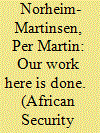| Srl | Item |
| 1 |
ID:
108662


|
|
|
|
|
| Publication |
2011.
|
| Summary/Abstract |
European leaders frequently vaunt the European Union's distinctiveness in adopting and pursuing a comprehensive approach to security. The EU's profile as an international actor is designed to span across all dimensions of security. As a result, its security policy portfolio involves a large number of institutional actors and policies that need to be coordinated. The ambition of the EU to provide security in a comprehensive manner raises challenges at the politico-strategic level, at the level of operational and policy planning and in day-to-day implementation. So far, the field is lacking an inclusive analytical framework for the analysis of providing security through a distinctively comprehensive civil-military, economic and political organisation. This article seeks to close this gap by providing suggestions for how the wide range of issues related to comprehensive security could be structured, and by framing the matter theoretically and with reference to existing conceptual work and empirical research.
|
|
|
|
|
|
|
|
|
|
|
|
|
|
|
|
| 2 |
ID:
106199


|
|
|
|
|
| Publication |
2011.
|
| Summary/Abstract |
Since the European Union's Organisation Operation Artemis in support of the United Nations mission in the Democratic Republic of Congo (MONUC) in 2003, Africa has become a key area of operations for the EU, an important source of lessons learned, and a test case for a constructive UN-EU partnership. The questions posed in this paper are whether the lessons learned have been the 'right' ones, and whether the hopes that the EU would become a vehicle for a revival of European peacekeeping in Africa have been met. The paper shows that despite initial hopes that it would become an active and responsible peacekeeper, the EU's African venture soon showed signs of strain. Routine claims to success, and a need to prove itself as a potent military actor, have made it hard for the EU to learn the right lessons from these operations and develop relations with the UN. A further problem is that the EU, through its short-term 'bridging operations', subsequently often increases the strain on the UN. Finally, the potential for drawing synergies between both organisations' unique potentials as civil-military actors has not been tapped.
|
|
|
|
|
|
|
|
|
|
|
|
|
|
|
|